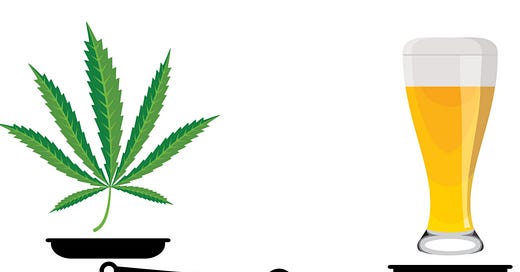Torn Between 2 Lovers: Cannabis vs Alcohol
Many people (and me on occasion) will jump on a bit of good cannabis news and amplify it far beyond its real value. A recent example was a study published in the May 2024 edition of the journal, Addiction. The study analyzed 4 decades of self-reporting data from the U.S. National Survey on Drug Use and Health.
The research found that over the 1992 to 2022 period, daily cannabis use (for the first time) had overtaken daily drinking – and by a not insignificant margin. However, alcohol remains the more widely used substance of the two, with relatively stable consumption rates.
I welcome these findings but consider them directional, not definitive. One report based on self-reporting data is far from conclusive.
This study has many unanswered questions and important nuances, such as:
> It is not clear that consumption has increased versus hidden users coming out of the closet.
> We don’t know where all the new consumption is going (ie the legal vs illicit market). Higher consumption into the illicit market is not a win for legal operators.
> This trend may not sustainable in some markets. Naturally, legal weed trialing increases post legalization but repurchase is not guaranteed over the medium term. See Colorado.
To explore these issues, I opened the research hood to see if there is a true consumption shift from alcohol to cannabis.
Drum roll please….
It’s too early to tell
This question is much more complicated than a single journal study nor does it lend itself to an either-or conclusion. Both products can be substitutes but also complements to each other.
A lot of research over the past couple of decades looked at this issue, including a systematic meta review of 65 studies. This was published in a 2020 issue of the Journal of Psychopharmacology.
The meta review found that 30 studies saw evidence for cannabis substitution, 17 for complementarity, 14 did not find indications for either, and 4 found evidence for both.
Overall, the evidence regarding complementarity or substitution of cannabis and alcohol is mixed. Yes, there is stronger support for substitution than complementarity.
However, the data also shows different effects in different populations and to some extent across diverse research designs. Furthermore, the quality of studies vary; few were designed specifically to address the substitution vs complementary question in a large, current and standardized market
It is risky to base your marketing strategy or funding decisions on a single, incomplete study or big assumption. If they haven’t done so, managers need to remove their rose-colored glasses and carefully weigh the implications of all research on their market sizing & growth, segmentation and understanding of consumer behavior.
#consumers #alcohol #marketing #branding #liquor #consumption


